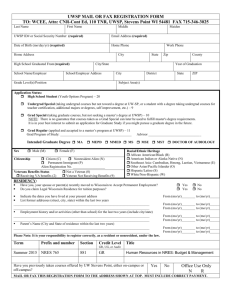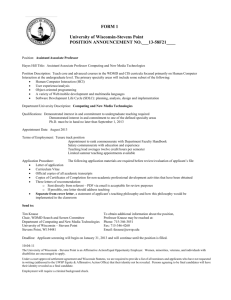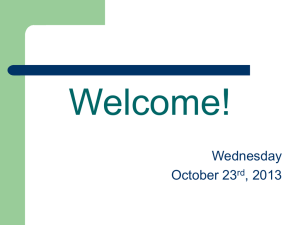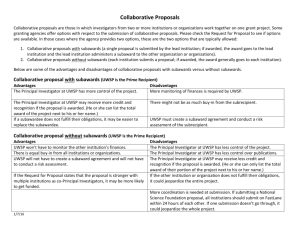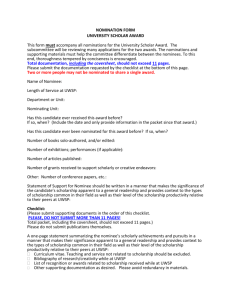TO REPORT OF A COMMISSION-MANDATED FOCUSED VISIT
advertisement
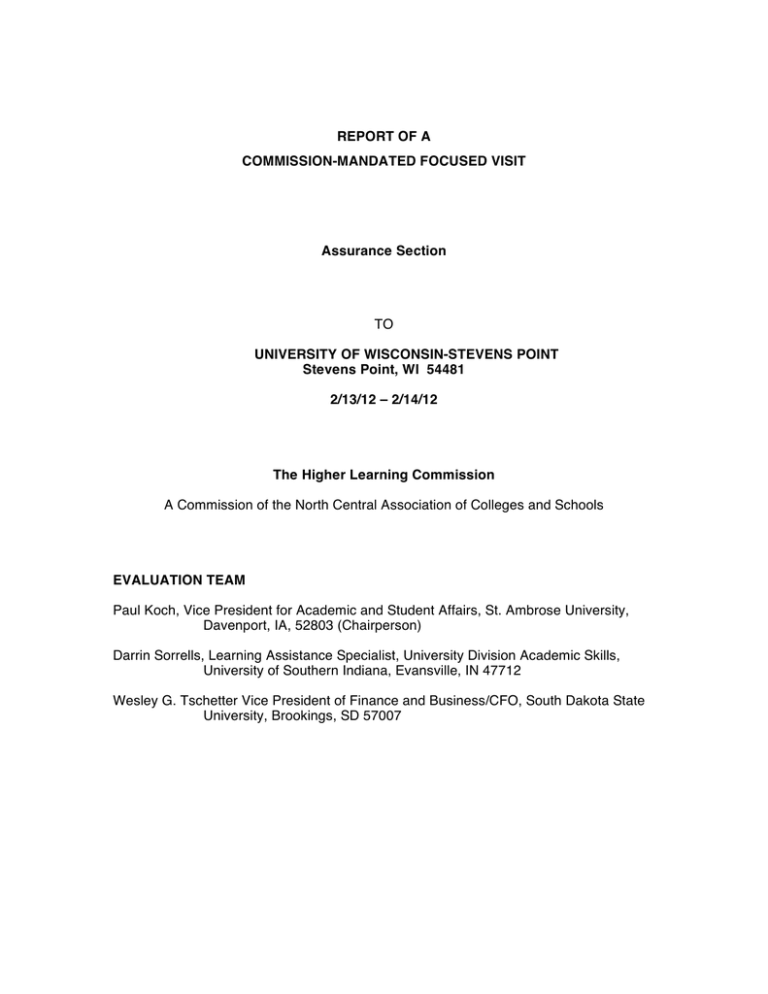
REPORT OF A COMMISSION-MANDATED FOCUSED VISIT Assurance Section TO UNIVERSITY OF WISCONSIN-STEVENS POINT Stevens Point, WI 54481 2/13/12 – 2/14/12 The Higher Learning Commission A Commission of the North Central Association of Colleges and Schools EVALUATION TEAM Paul Koch, Vice President for Academic and Student Affairs, St. Ambrose University, Davenport, IA, 52803 (Chairperson) Darrin Sorrells, Learning Assistance Specialist, University Division Academic Skills, University of Southern Indiana, Evansville, IN 47712 Wesley G. Tschetter Vice President of Finance and Business/CFO, South Dakota State University, Brookings, SD 57007 Assurance Section University of Wisconsin-Stevens Point/1716 CONTENTS I. Context and Nature of Visit ...................................................................................... 3 II. Area(s) of Focus....................................................................................................... 7 III. Affiliation Status ..................................................................................................... 13 2 April 11, 2012 Assurance Section I. University of Wisconsin-Stevens Point/1716 CONTEXT AND NATURE OF VISIT A. Purpose of Visit The purpose of the visit to the University of Wisconsin-Stevens Point (UWSP) was to conduct a Commission mandated focused visit on assessment with a particular emphasis on the assessment and subsequent revision of the General Education program and General Degree Requirements. B. Accreditation Status UWSP has been continuously accredited by the Higher Learning Commission since 1951. The universityʼs most recent comprehensive evaluation for continued accreditation occurred spring 2008, at which time it was recommended that the next comprehensive evaluation for continued accreditation occur during the 2018 – 2019 academic year along with a commission mandated focus visit spring 2012. C. Organizational Context Like many institutions of higher education in the United States, the University of Wisconsin system has incurred budget cuts due to a lack of state funding over the past several years that amount to over $4 million, with an additional lapse of $1.9 million occurring during the current fiscal year. Despite these financial challenges, the university continued to move forward in several key areas, including completion and initial implementation of a strategic plan with four key areas: “Advance Learning, Enhance Living, Develop and Leverage Resources, and Respect and Advance Our Legacy.” In addition, there have been a number of staff changes in key administrative areas, including: interim appointments for Provost and Vice Chancellor for Academic Affairs, Associate Vice Chancellor for Teaching, Learning, and Academic Programs, Vice Chancellor for University Advancement, and Director of University Relations and Communications. Despite these challenges, and the universityʼs own report of inadequate efforts to respond in the past to the identified challenges leading to this mandated focused visit, UWSP faculty, staff, and administrative members have taken the challenges seriously and have responded as identified in the sections below. D. Unique Aspects of Visit 3 April 11, 2012 Assurance Section University of Wisconsin-Stevens Point/1716 None E. Interactions with Organizational Constituencies Assistant Director, Allen Center for Health and Wellness Programs Associate Dean (retired) Associate Dean, College of Natural Resources Associate Dean and Head, Division of Interior Architecture Chair of Department Review Subcommittee Chair of Faculty Senate Chair, Institutional Review Board Co-Chairs of Assessment Subcommittee Co-Chairs of General Education Policy Review Committee (GEPRC) Coordinator of Freshman Interest Groups, Residential Living Deans, Department Chairs, Directors Group Meeting (26) Dean, College of Letters and Science Director, Learning Resource Center and Library Director, Office of Policy Analysis and Planning Director, Student Academic Advising Center Director, Tutoring-Learning Center Discipline Coordinator, Soil & Waste Resources Faculty, Various (duplicated headcount; 23) Faculty Senate Group Meeting (7) First-year Seminar Group Meeting (14) Interim Assessment Coordinator Interim Associate Vice Chancellor Academic Affairs Interim Director of CAESE Interim Provost and Vice Chancellor for Academic Affairs Staff, Various (9) Undergraduate Student Meeting (8) Vice Chancellor for Student Affairs F. Principal Documents, Materials, and Web Pages Reviewed Focused Visit Report UWSPʼs Response to Concerns Raised by the HLC Institutional Snapshots (IPEDS Reports 2009 – 2011) Faculty and Staff Handbook Student Handbook Course Catalog Online Resource Room: http://www.uwsp.edu/acadaff/Pages/HLC2012.aspx All of the documents listed below were available in the HLC Focused Visit Resource Room: Appendix A: Previous Reports 4 April 11, 2012 Assurance Section University of Wisconsin-Stevens Point/1716 UWSP Comprehensive Self-Study 2008 Link to UWSP Self-Study Report Resource Room 2008 HLC Report 2008 UWSP Gen Ed Research Team Report 2007 AASCU Team Report 2006 Appendix B: General Education Policy Review Committee (GEPRC) GEPRC Charge from Provost Email GEPRC Charge from Provost Summary GEPRC Charge from Faculty Senate (updated) Step 1 Mission Statement and Step 2 Program Outcomes (Approved) Step 3 General Education Model (Approved) GEP Step 4 Structural Components and Measurable Outcomes (Approved) GEP Step 4 Diagram GEP Results of Step 5 Survey GEP Step 5 Course Criteria (Approved) UWSP Degree Requirements (Approved) GEP Step 6 Implementation and Assessment (Approved February 1, 2012) Links to GEPRC and GEP Resources (GEPRC Meeting Minutes; Discussion of Steps 1-6) Appendix C: Assessment Subcommittee (ASC) ASC Findings from Department Meetings 2010 Links to ASC Meeting Agendas and Meeting Minutes Reporting Cycle for 2011-2021 Summary of Achievements by the Assessment Subcommittee Faculty Testimonials about Assessment Academy Workshops Assessment Section from University Handbook Revised Assessment Report Format Assessment Report Rubric Appendix D: Assessment Academy Workshops Appendix E: HLC Assessment Academy Team (HLCAAT) General Education Assessment Plan (from Step 6, p 15-42) Maki Site Visit Report 2011 HLC Showcase Poster 2011 Link to HLCAAT Minutes (PDF document with link) Institutional Map of Surveys Appendix F: First Year Seminar Pilot Program (FYS) 5 April 11, 2012 Assurance Section University of Wisconsin-Stevens Point/1716 First Year Seminar (UWSP Learning Outcomes) FYS Brochure Fall 2011 FYS Course Descriptions Fall 2011 FYS Course Proposal Form for Instructors FYS Course Proposal Form Rubric FYS Assessment Project (memo) FYS Building a Course Portfolio FYS Pilot Survey Spring 2011 Final Report Links to FYS Sharepoint Sites (Teaching Site, Planning Site) FYS Instructor Reflection Sessions December 2011 Appendix G: Department Review Subcommittee (DRS) Revised Department Review Section of University Handbook Department Review Subcommittee Self-Study Table of Contents Department Review Subcommittee Timeline and Task Checklist Department Review Subcommittee Process Diagram Reporting Cycle for 2011-2021 Appendix H: Additional Documents and Resources GEC Constitution Article XII UWSP Strategic Plan FINAL July 2011 Link to UWSP Strategic Planning Website Inclusive Excellence Strategic Plan October 2010 Link to UWSP Inclusive Excellence Website UW System Inclusive Excellence FAQ Short Version UW System Towards Inclusive Excellence PowerPoint (handout) UWSP Inclusive Excellence 4 Phase Implementation (handout) UW System Benefits of Inclusive Excellence Links to UWSP Offices and Initiatives Additional Documents Requested or Reviewed During the Visit Confirmation of Funding for Directors of General Education and Assessment General Education Committee Minutes and Summary of Course Approvals Program Assessment Plans and Feedback Forms Program Learning Outcomes Revised and Approved Faculty Handbook Language on Assessment and Department Review (effective summer 2012) “Welcome Packet” for Department Review from Department Review Subcommittee 6 April 11, 2012 Assurance Section II. University of Wisconsin-Stevens Point/1716 AREA(S) OF FOCUS [Complete the following A and B sections for each area of focus. Number each topic accordingly (i.e., A-1, B-1; A-2, B-2, etc.] A-1. Statement of Focus The area of focus for the visit was assessment with a particular emphasis on the assessment and subsequent revision of the General Education program and General Degree Requirements. B-1. Statements of Evidence • Evidence that demonstrates adequate progress in the area of focus. Bolstered by the activity of the Assessment Academy Team (AAT), the university accomplished a major reform of its general education program in a period of less than four years. The program was modeled to some extent after the Liberal Education America’s Promise (LEAP) recommendations produced by the ACC&U. The UWSP Faculty Senate developed a six-step process that was communicated effectively to all constituencies and the school completed all six steps, largely on time. Faculty demonstrated, based on review of minutes, documents produced to date, and their comments, clear ownership of the General Education Program. In nearly all settings the team found that there is university wide support for the new General Education Program which will be implemented in the fall of 2013. Academic administrators gave strong support by noting the reduction in required hours and a clearer path for the student to manage the completion of requirements. Importantly, the general education program now provides a common program, regardless of undergraduate degree type, helping to ensure a common brand for UWSP graduates and addressing the issue of General Degree Requirements brought up as a factor in the request by the previous team for this focused visit. The program may have positive impact on students’ ability to finish their degree requirements earlier, even to the point of saving one or two semesters toward graduation. Despite significant budget challenges brought about by reduced funding from the State, UWSP has secured funding for the position of Director of General Education. This position will be a half-time position, likely secured after an internal search. The General Education Committee, based on documents reviewed and discussions held with committee members, has a clear mandate to provide leadership for the General Education Program along with the Director of General Education, including assessment. Such a delineation of 7 April 11, 2012 Assurance Section University of Wisconsin-Stevens Point/1716 responsibilities along with measures to enhance accountability will assist UWSP in sustaining the significant progress it has made to date. The First Year Seminar (FYS) was implemented at UWSP in spring 2011. Twelve sections were piloted in spring 2011; twenty-four FYS sections were offered in fall 2011. The FYS is designed to serve as a foundational course for new UWSP students, exposing them to the importance of a liberal education and equipping them with the necessary academic skills to be successful. Among those skills, a specific focus is on critical thinking, information literacy, and the willingness to assume responsibility for one’s own learning as a college student. Faculty members who are interested in designing and teaching a FYS section are required to submit a course proposal to the First Year Seminar Planning Committee for consideration. If approved to instruct a section of FYS, the faculty member is required to design and submit a course portfolio to the General Education Committee at the completion of the course. The course portfolio is a measure of assessment that includes the course syllabus containing expected learning outcomes, a narrative outlining how general education outcomes are met through course assignments and experiences, and at least three examples of student work from the course that illustrate various levels of student achievement. While still in its infancy, this assessment process positions UWSP to use the evidence collected via the course portfolio process for course improvement once a cycle of evidence collection, analysis, and interpretation is completed. The commitment of UWSP students to support various focus-related initiatives, including the revision of general education and embracing a campus culture of assessment and continuous quality improvement, is apparent. For example, a majority of members of the UWSP Student Government Association have recently supported a new measure known as the Pointer Compact, an initiative to introduce differential tuition on campus. Currently, UWSP is one of only three University of Wisconsin System institutions that do not have differential tuition. If approved by the Wisconsin legislature and the Board of Regents, when fully implemented, each UWSP student will pay an additional $648 per academic year. The extra money generated, more than $5.4 million annually, will be used to support and expand such initiatives as the new First Year Seminar, increased experiential and service learning opportunities for students, and expansion of learning assistance programs. The team finds this student commitment and dedication to their school to be quite commendable, particularly within the current economic climate that financially impacts the lives of many students in Wisconsin and across much of the nation. 8 April 11, 2012 Assurance Section University of Wisconsin-Stevens Point/1716 The Cross-Division Assessment Team (CDAT) is a new group on campus that began its work during the fall 2011 semester. Stemming from the past success of the former Student Affairs Assessment Team, the CDAT is comprised of personnel representing multiple units from both Academic Affairs and Student Affairs. The 14member team serves as an advocacy group for assessment within the various units in Academic Affairs and Student Affairs. By sharing information and working collaboratively with their colleagues from multiple units, the CDAT assists various departments to understand assessment processes and how to use data collected for informed and effective decision-making. In turn, services are improved as well as overall student learning on campus. Each unit within Academic Affairs and Student Affairs will have a five-year assessment cycle of reporting. During this five-year cycle, each unit will develop a comprehensive assessment plan, propose the plan to the CDAT for feedback, meet with unit members and CDAT members to prepare the reports, revise drafts of the report, and eventually deliver the report’s findings orally to an audience of CDAT members and other campus constituents. Although a new group on campus, the team believes that the CDAT is poised to build upon the work of the former Student Affairs Assessment Team and significantly contribute in the future to the promotion and advancement of a true campus culture of assessment. The Assessment Sub-Committee is part of the Academic Affairs Committee, a standing committee of the UWSP Faculty Senate. In its role, the Assessment Sub-Committee primarily functions as an advocacy group on campus for assessment. As such, members of the Assessment Sub-Committee visit various academic departments across campus throughout the year to meet with individuals from those departments and to learn about respective departmental assessment initiatives. In addition, members of the Assessment SubCommittee actively promote a campus culture of assessment and continuous quality improvement among their colleagues by conducting workshops and informational sessions for members of the campus community. The group has helped to advance a positive paradigm shift in thinking on campus related to assessment. Individual academic departments use assessment procedures for the departmental review process. The Assessment Sub-Committee plays an important role on campus, not only as an assessment advocacy group, but also working in conjunction with the Provost and Deans to maintain a climate of accountability for assessment processes at UWSP. Importantly, UWSP has secured funding for an Assessment Coordinator in the face of budget challenges demonstrating the clear priority that is being placed on assessment across the university. This leadership position will assist the Assessment Sub-Committee in its critical role and will serve as a liaison with other committees on 9 April 11, 2012 Assurance Section University of Wisconsin-Stevens Point/1716 campus as UWSP continues on its journey as it establishes a culture of assessment on its way to a culture of student learning. The Center for Academic Excellence and Student Engagement (CAESE) reflects a grass roots movement teaching faculty the value of learning from one another to help ensure student learning using assessment as a tool rather than an end unto itself. Attention to these activities, despite budget challenges, promises to enhance sustainability of good assessment practices over the long term. CAESE advisory board members and those involved in the teaching learning center activities gave high praise for its role in mentoring faculty and assisting all faculty in understanding the value of the scholarship of learning. While there is no physical center to date, the references by many faculty of the “teaching learning activities” certainly is viewed as a valuable tool by the faculty who make use of the activities. Due to budget considerations, the future financial support of the formal teaching learning center appears at risk but statements by faculty and staff suggest that support activities will continue. • Evidence that demonstrates that further organizational attention is required in the area of focus. The economic condition of the state continues to impact the school’s ability to move forward in critical areas, with a minimum of a $1.9 million lapse to occur yet in this fiscal year. The team was informed of the state of Wisconsin’s budgetary reduction plans impact on the University system and specifically, UWSP. The term “lapse” is used to denote one-time reductions with the base budget remaining intact for the subsequent fiscal year or biennium. With a base Fiscal Year reduction of $4.2 million already in place for the current (FY 2012) and subsequent fiscal year (FY 2013), another reduction is pending that ranges from $1.9 to $3.1 million. Given the size of the institutional budget, these cuts are in the range of approximately 1% of the total budget for each million dollar reduction. Not known at the time of the team visit was the amount of the reduction or whether it will be onetime or a base budget resource reduction. The institution is planning for the worse scenario with potential tuition increases and programmatic changes. Legislative and Governor actions may produce another one-time reduction for FY 2013. Due, in part, to the reduction of funding, some key positions on campus in the future may not be filled once vacant positions arise. The current Director of the Center for Academic Excellence and Student Engagement (CAESE) has been serving as Interim Director for the past six years. That person will retire in March 2012, and the position is not expected to be filled with a replacement. The CAESE 10 April 11, 2012 Assurance Section University of Wisconsin-Stevens Point/1716 operating budget is in question for the future. Another challenge for the CAESE has been that no permanent office space has been used on campus to support the CAESE operations. Professional development activities will continue on campus in the future, especially through the work of faculty colleagues in each college and faculty learning communities. However, these initiatives are still relatively new and will need support and guidance moving forward in order to be effective. To help sustain the positive momentum that has been generated on campus during the past four years related to the areas of assessment and general education, and to continue to build an overall campus culture of assessment moving forward, UWSP would be well-advised to explore opportunities to sustain this important area of faculty development and support. Given that several positions continue to hold the title of interim, there continues to be uncertainty in staffing key senior management and administrative staff positions that are critical to the success of the UWSP’s progress in addressing the current area of focus. Positions holding the title of interim at the time of the visit include: interim appointments for Provost and Vice Chancellor for Academic Affairs, Associate Vice Chancellor for Teaching, Learning, and Academic Programs, Vice Chancellor for University Advancement, and Director of University Relations and Communications. While this situation is not fully under UWSPʼs control, and it may be partially resolved by the beginning of the next academic year, the team encourages continued thought to these positions to enhance the universityʼs sustainability of progress made to date. Assessment activities were previously reported on every two years. A concern was raised in the self-study and in conversations on campus that this reporting cycle left, “too little time for faculty to implement and measure the impact of curricular changes between reports” (SelfStudy, p. 10). As a result, a new five-year reporting cycle has been created where departments will be expected to evaluate student learning each year, but will report on their assessment activities only every five years to give them adequate time to between formal reports to effectively implement and evaluate curricular changes they make to improve student learning. This coincides with an increase in the department program review cycle from 8 to 10 years to coincide with the timing of formal reporting of assessment activities. It was not fully clear, however, what formal mechanisms were in place to ensure that academic departments were engaged in the process of assessing student learning, when some departments, based on self-reporting at committee meetings, were yet to fully use data collected to assess student learning. A lack of an interim reporting period for either assessment or program review could challenge the UWSPʼs ability to 11 April 11, 2012 Assurance Section University of Wisconsin-Stevens Point/1716 sustain the significant progress it has made given that there is some degree of inconsistency among departments. • Evidence that demonstrates that further organizational attention and Commission follow-up are required. While there is a plan for assessing the new general education program, it is yet to be implemented. There is no fixed timeline for developing rubrics or other measures of student learning arising out of the faculty learning communities described for the assessment of the general education courses (p. 31 of focused visit self-study). Comments from senior administrators in group meetings indicated that such rubrics needed to be developed organically from the faculty and that such a process could take five years or longer. While the team appreciates the need to fully engage faculty members in this process, UWSP has also identified in its General Education Assessment Plan approved February 2012 that it will begin to assess Foundation-Level Courses (First-Year Seminar, Written and Oral Communication, Quantitative Literacy, and Wellness) and Program Outcomes 1 (Demonstrate critical thinking, quantitative, and communication skills necessary to succeed in a rapidly changing global society) in 2013 – 2014 (year one of implementation of the program). As such, there appears to be a clear discrepancy between what UWSP states in its approved documents and what people see as the next steps. Failure to move quickly on development of rubrics or other measures to evaluate stated outcomes could greatly handicap UWSP’s ability to sustain the significant progress it has made to date. There continues to be unevenness in where departments are in terms of assessment for improving student learning as reported from departmental representatives. While all departments have established student learning outcomes and assessment plans, some are yet to fully complete a cycle of evidence collection in order to be able to evaluate the evidence collected while others are closing the loop and changing curriculum to enhance student learning. While it is clear that the culture has shifted toward a fully mature culture of assessment and student learning, such inconsistency threatens to undermine the progress UWSP is making overall in sustaining significant change at the university. Given the evidence presented in this Assurance Section, the team recommends a Progress Report to be submitted by January 15, 2015 that provides evidence the assessment has not only been planned, but has been implemented and is being used to enhance student learning. 12 April 11, 2012 Assurance Section • University of Wisconsin-Stevens Point/1716 Evidence is insufficient and demonstrates that Commission sanction is warranted. None. C. Other Accreditation Issues None evidenced. D. Recommendation of Team • E. Evidence demonstrated. Commission follow-up recommended Rationale for the Team Recommendation The many groups working on the area of assessment focus have shared understandings of what the goals and objectives of their activities are as evidenced by commentaries of committee members across all levels of the governance structure and based on documents the team reviewed before, during, and after its visit. As noted elsewhere in this report, however, there are factors influencing the team’s recommendation that a progress report be submitted to the Commission by January 15, 2015 (see details below). Given the rapid progress that UWSP has demonstrated in its ability to respond appropriately to Commission mandates the team believes that it will be a relatively easy task for the university to document its sustained progress, which will meet the expectations of the Progress Report as outlined below. III. STATEMENT OF AFFILIATION STATUS Affiliation Status No change. Nature of Organization No change. Legal status No change. Degrees awarded 13 April 11, 2012 Assurance Section University of Wisconsin-Stevens Point/1716 Conditions of Affiliation No change. Stipulation on affiliation status No change. Approval of degree sites No change. Approval of distance education degree No change. Reports required Progress Report Topic(s) and Due Date: Assessment of General Education and Academic Departmentsʼ student learning outcomes due January 15, 2015 Rationale and Expectations As noted above, there is a plan for assessing the new general education program, but it is yet to be implemented. There is no fixed timeline for developing rubrics or other measures of student learning arising out of the faculty learning communities described for the assessment of the general education courses. The report is expected to document: 1. Complete development of the general education (GE) assessment rubrics/instruments for implementation of the new GE program Year 1 (GE Program Outcome 1; assessment cycle scheduled for 2013 - 2014), Year 2 (GE Program Outcome 2; assessment cycle scheduled for 2014 - 2015), and Year 3 (GE Program Outcome 3; assessment cycle scheduled for 2015 – 2016). It is expected that UWSP will be in the process of developing rubrics/instruments for the assessment of the remaining general education program outcome for Year 4 (GE Program Outcome 4) if it has not been 14 April 11, 2012 Assurance Section University of Wisconsin-Stevens Point/1716 completed yet. Year 5 is scheduled for the comprehensive review of the program. 2. Collection and analysis of evidence for GE Program Outcome 1. 3. Recommended changes, if any, arising out of the assessment process for GE Program Outcome 1. There continues to be unevenness in where departments are in terms of assessment for improving student learning as reported from departmental representatives. While all departments have established student learning outcomes and assessment plans, some are yet to fully complete a cycle of evidence collection in order to be able to evaluate the evidence collected while others are closing the loop and changing curriculum to enhance student learning. The report is expected to document: 4. Collection and analysis of direct evidence of student learning by all academic programs of at least some program student learning outcomes along with any recommendation changes to improve student learning arising out of analysis of such evidence. Other Visits Scheduled None recommended. Commission Sanction or Adverse Action None recommended. Summary of Commission Review Year for next comprehensive evaluation 2018 - 2019 15 April 11, 2012 REPORT OF A COMMISSION-MANDATED FOCUSED VISIT Advancement Section TO UNIVERSITY OF WISCONSIN-STEVENS POINT Stevens Point, WI 2/13/12 – 2/14/12 The Higher Learning Commission A Commission of the North Central Association of Colleges and Schools EVALUATION TEAM Paul Koch, Vice President for Academic and Student Affairs, St. Ambrose University, Davenport, IA, 52803 (Chairperson) Darrin Sorrells, Learning Assistance Specialist, University Division Academic Skills, University of Southern Indiana, Evansville, IN 47712 Wesley G. Tschetter, Vice President of Finance and Business/CFO, South Dakota State University, Brookings, SD 57007 Advancement Section University of Wisconsin-Stevens Point/1716 ADVANCEMENT SECTION CONSULTATION OF TEAM A. Observations of Team Regarding Area(s) of Focus As noted in the Assurance Section of this report, the University of Wisconsin – Stevens Point (UWSP) has made significant progress in the area of focus. The Team was impressed in the institution’s ability to develop and implement a process that led to the development of a revised General Education (GE) Program that students participate in, regardless of undergraduate program, in slightly less than four years. Given that all students participate in the new GE Program, this alleviated concerns about the General Degree Requirements cited by the Team that visited UWSP for their last comprehensive review for continuing accreditation. The implementation of the GE Program, set to begin fall 2013, is accompanied by a well thought out plan for assessment of student learning outcomes. It is clear that UWSP has made significant progress on its way toward a Culture of Assessment on its way toward a fully developed Culture of Student Learning. Many academic departments are collecting and using evidence to improve student learning, yet there is still some inconsistency across departments. While such inconsistencies are not uncommon, the following brief consultation is offered in order to assist UWSP in sustaining the progress it has made to date. The consultation is also offered in the spirit that it is clear that UWSP faculty, staff, and administrators generally know what needs to be done. B. Consultations of Team As noted in the Assurance Section of this report, UWSP has moved from a 2- to 5-year reporting cycle on assessment of student learning (to be reviewed by the Assessment Subcommittee) that coincides with the increase from an 8- to 10-year cycle for Department Program Review (to be reviewed by the Department Review Committee). While the team understands the desire to give departments the opportunity to collect and evaluate evidence collected in order to make changes, it is not clear what formal system of accountability is in place to ensure that activity is taking place during the interim years. It is theoretically possible for a department to do little-to-nothing in terms of the assessment of student learning during a five-year period. To rectify this concern, the school might consider annual reports that simply identify: 1) which student learning outcomes were measured using what instruments, 2) a brief summary of the evidence discovered from the measurement, and 3) likely areas of improvement to focus on; such a report takes a department chair or program director very little time to fill out. Such a process provides a more formal system of accountability where the school can intervene should there be multiple 2 April 11, 2012 Advancement Section University of Wisconsin-Stevens Point/1716 years where no assessment of student learning occurs without waiting the full five years. UWSP has begun to carefully think about and advance assessment on its campus in multiple academic and non-academic units. To assist with these efforts, various groups on campus have been actively engaged, including faculty senate committees and subcommittees as well as the CDAT. The additions of a new part-time assessment coordinator and a new part-time general education coordinator will help the institution to maintain its focus on future assessment initiatives. Because UWSP has multiple groups involved with assessment activities on campus, confusion about reporting information, data collection and analysis, and ultimate authority may arise. UWSP may want to consider bringing all groups together on a regular basis so everyone has a clear understanding of the progress made and what future actions need to be undertaken. Such group meetings could also facilitate an evaluation of where redundancies in processes and procedures are occurring that would allow UWSP to streamline what it is doing. The Center for Academic Excellence and Student Engagement (CAESE) supports the work of faculty and staff at UWSP by offering various professional development opportunities. It has played a critical role in promoting assessment across campus. The future funding of the CAESE is in jeopardy due to recent budget cuts. In addition, the CAESE has never truly had a dedicated permanent office location on campus. To assist with future initiatives on campus, UWSP may want to explore alternative funding measures to maintain the CAESE, perhaps through the campus development office or an outside corporate donor; even limited resources would help to sustain the Center. While it is clear that faculty, staff, and administrators are supportive of the activities that are occurring, the lack of space and staff could diminish attention to important details over time. 3 April 11, 2012 Team Recommendations for the STATEMENT OF AFFILIATION STATUS INSTITUTION and STATE: University of Wisconsin-Stevens Point, WI TYPE OF REVIEW (from ESS): Focused Visit-Mandated DESCRIPTION OF REVIEW (from ESS): A visit focused on assessment with a particular emphasis on the assessment and subsequent revision of the General Education program and General Degree Requirements DATES OF REVIEW: 2/13/12 - 2/14/12 Nature of Organization LEGAL STATUS: Public TEAM RECOMMENDATION: No Change DEGREES AWARDED: A, B, M, D TEAM RECOMMENDATION: No Change Conditions of Affiliation STIPULATIONS ON AFFILIATION STATUS: Programs at the doctoral level are limited to the Doctor of Audiology degree, delivered in conjunction with the University of Wisconsin-Madison. TEAM RECOMMENDATION: No Change APPROVAL OF NEW ADDITIONAL LOCATIONS: Prior Commission approval required. TEAM RECOMMENDATION: No Change APPROVAL OF DISTANCE EDUCATION DEGREES: The Commission's policies and definitions for distance and correspondence education recently underwent significant change. Some institutions are currently under review to ensure conformity with the revised policies. This entry will be updated in the coming months following completion of that review. TEAM RECOMMENDATION: No Change REPORTS REQUIRED: None TEAM RECOMMENDATION: Due by January 15, 2015; A Progress Report on Assessment of General Education and Academic Departmentsʼ student learning outcomes, OTHER VISITS SCHEDULED: Focused Visit-Mandated: 2011 - 2012; A visit focused on assessment with a particular emphasis on the assessment and subsequent revision of the General Education program and General Degree Requirements TEAM RECOMMENDATION: None Summary of Commission Review Team Recommendations for the STATEMENT OF AFFILIATION STATUS YEAR OF LAST COMPREHENSIVE EVALUATION: 2007 - 2008 YEAR FOR NEXT COMPREHENSIVE EVALUATION: 2018 - 2019 TEAM RECOMMENDATION: No Change ORGANIZATIONAL PROFILE INSTITUTION and STATE: University of Wisconsin-Stevens Point, WI TYPE OF REVIEW (from ESS): Focused Visit-Mandated __X_ No change to Organization Profile Educational Programs Program Distribution Recommended Change (+ or -) Programs leading to Undergraduate Associate Bachelors 1 106 Masters Specialist First Professional Doctoral 9 0 Programs leading to Graduate 1 Off-Campus Activities In-State: Present Activity: Campuses: Additional Locations: Course Locations: None Fond du Lac (UW-Fond du Lac) ; Marinette County (UWMarinette) ; Marshfield (UWMarshfield/Wood County) ; Menasha (UW-Fox Valley) ; Wausau (UW-Marathon County) 1 Out-of-State: Campuses: Additional Locations: Course Locations: Present Wording: Recommended Change: (+ or -) Present Wording: Recommended Change: (+ or -) None None None Out-of-USA: Campuses: Additional Locations: Course Locations: Recommended Change: (+ or -) None None None Distance Education Programs: Present Offerings: Bachelor - 13.1210 Early Childhood Education and Teaching (BA/BS Early Childhood Education) offered via Interactive TV or video;Internet; Bachelor - 24.0101 Liberal Arts and Sciences/Liberal Studies (BA/BS American Studies) offered via Interactive TV or video;Internet; Bachelor - 52.0201 Business Administration and Management, General (BA/BS Business Administration) offered via Interactive TV or video;Internet; Master 03.0101 Natural Resources/Conservation, General (MS Natural Resources, emphasis in Environmental Education and Interpretation) offered via Interactive TV or video;Internet; Master - 03.0101 Natural Resources/Conservation, General (MS Natural Resources, emphasis in Environmental Education for K-12 Teachers) offered via Interactive TV or video;Internet; Master - 03.0101 Natural Resources/Conservation, General (MS Natural Resources, emphasis in Leadership and Administration) offered via Interactive TV or video;Internet; Master - 13.0101 Education, General offered via Internet; Master - 13.0101 Education, General (MS Education, General with emphasis in early childhood/early childhood special education) offered via Interactive TV or video;Internet Recommended Change: (+ or -) Correspondence Education Programs: Present Offerings: None
